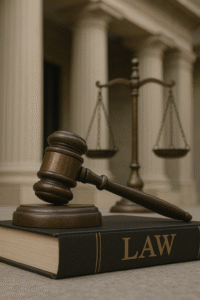
Understanding the U.S. Legal System: Structure, Roles, and Processes (2025)
The United States legal system is a complex framework grounded in constitutional principles, the rule of law, and federalism. It governs everything from individual rights to criminal prosecutions, civil lawsuits, and administrative procedures. Whether you are a student, legal professional, or engaged citizen, understanding how this system operates is key to navigating life in the U.S.
Last Updated: June 24, 2025
Overview of the U.S. Legal System
The U.S. legal system is structured into two parallel systems: federal law and state law. Each has its courts, procedures, and laws, but both operate under the framework of the U.S. Constitution, which is the supreme law of the land.
Key Principles:
- Federalism: Shared authority between federal and state governments
- Separation of Powers: Divides government into legislative, executive, and judicial branches
- Checks and Balances: Prevents any one branch from gaining too much power
The Three Branches of Government
1. Legislative Branch
- Made up of the U.S. Congress (Senate and House of Representatives)
- Writes and passes federal laws
2. Executive Branch
- Led by the President
- Enforces and administers laws
- Includes federal agencies like the Department of Justice (DOJ)
3. Judicial Branch
- Interprets laws and ensures they comply with the Constitution
- Headed by the U.S. Supreme Court
These branches work in tandem under a system of checks and balances that ensures legal accountability.
Federal Court System
The federal judiciary handles cases involving federal law, constitutional questions, and disputes between states or foreign parties.
1. U.S. District Courts
- 94 districts
- Serve as trial courts for federal cases
2. U.S. Courts of Appeals
- 13 circuits
- Review cases from district courts
3. U.S. Supreme Court
- The highest court
- Hears cases of national significance or constitutional importance
State Court Systems
Each U.S. state has its own court system, which generally includes:
- Trial Courts (handle civil and criminal cases)
- Intermediate Appellate Courts (in some states)
- State Supreme Courts (the highest court within the state)
States may also operate specialized courts such as
- Family courts
- Juvenile courts
- Probate courts
State laws must align with the U.S. Constitution but often differ significantly in areas like criminal sentencing, civil procedure, and small claims rules.
Sources of U.S. Law
The legal system in the U.S. is based on multiple sources:
- Constitutional Law—U.S. and state constitutions
- Statutory Law—Laws passed by legislatures
- Administrative Law—Rules made by government agencies
- Case Law—Judicial interpretations and precedents
The U.S. follows a common law tradition, meaning that courts use precedent to guide decisions.
Civil vs. Criminal Law
Criminal Law
- The government prosecutes individuals or entities for actions considered offenses against the public
- Penalties include fines, imprisonment, or probation
Civil Law
- Disputes between private parties over rights, contracts, property, or injuries
- Outcomes typically involve monetary compensation or injunctions
Due Process and Legal Protections
The Constitution guarantees various rights in legal proceedings:
- Due Process Clause (5th and 14th Amendments)
- Right to a fair trial
- Right to legal counsel
- Right against self-incrimination
- Equal protection under the law
These protections ensure that all individuals receive fair and impartial treatment under the law.
Frequently Asked Questions (FAQ)
What makes the U.S. legal system unique?
Its foundation in common law, federalism, and judicial review distinguishes it from other legal systems.
Can state and federal laws conflict?
Yes, but the Supremacy Clause of the U.S. Constitution ensures that federal law prevails when conflicts arise.
Are all judges appointed?
Federal judges are appointed for life by the President and confirmed by the Senate. States use a mix of elections and appointments.
What does the Supreme Court do?
The Court interprets the Constitution, resolves federal disputes, and sets legal precedents that affect the entire country.
Disclaimer
This article is intended for general educational purposes and does not constitute legal advice. For specific legal concerns, consult a qualified attorney.
Internal Links:
- “differences between civil and criminal law” →: https://uslawguide.net/civil-vs-criminal-law
External Links:
- “U.S. Courts Official Site” →: https://www.uscourts.gov/
- “U.S. Constitution (Full Text)” →: https://www.archives.gov/founding-docs/constitution-transcript